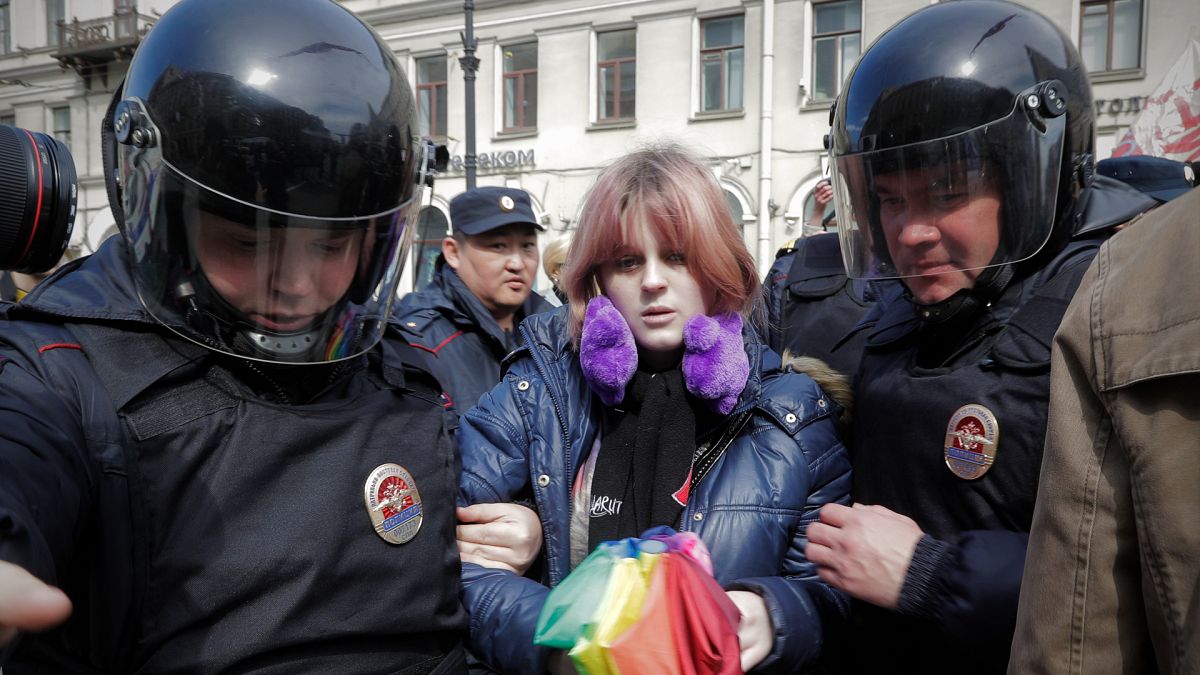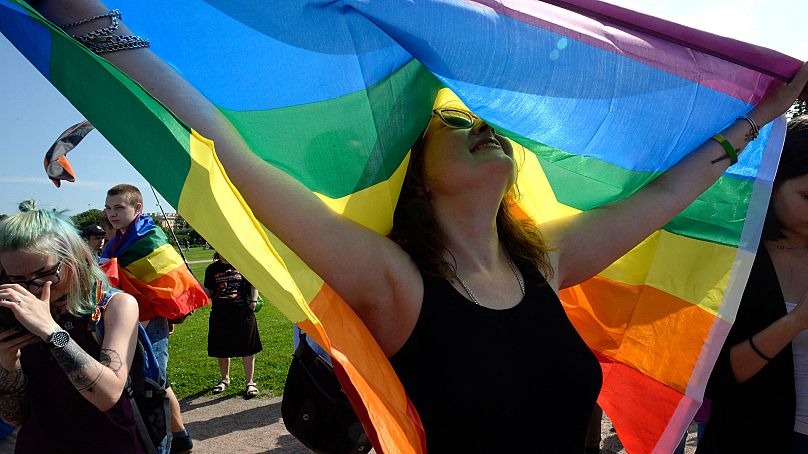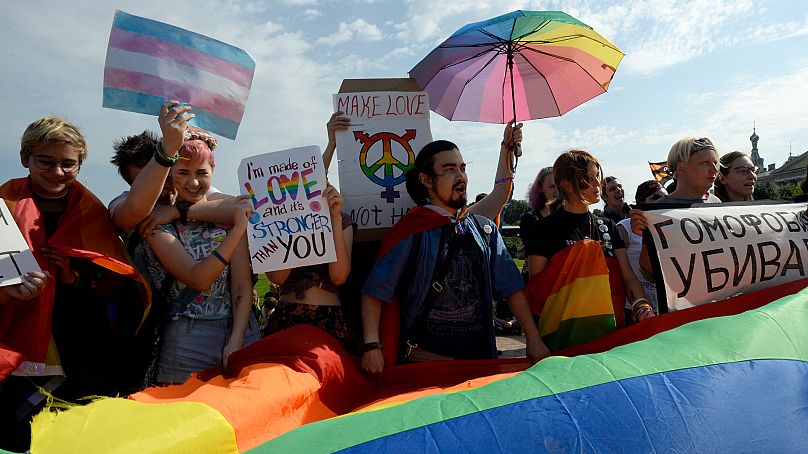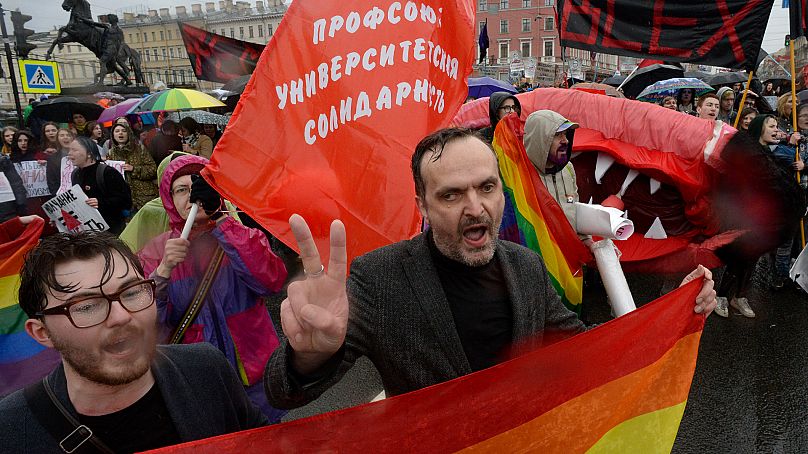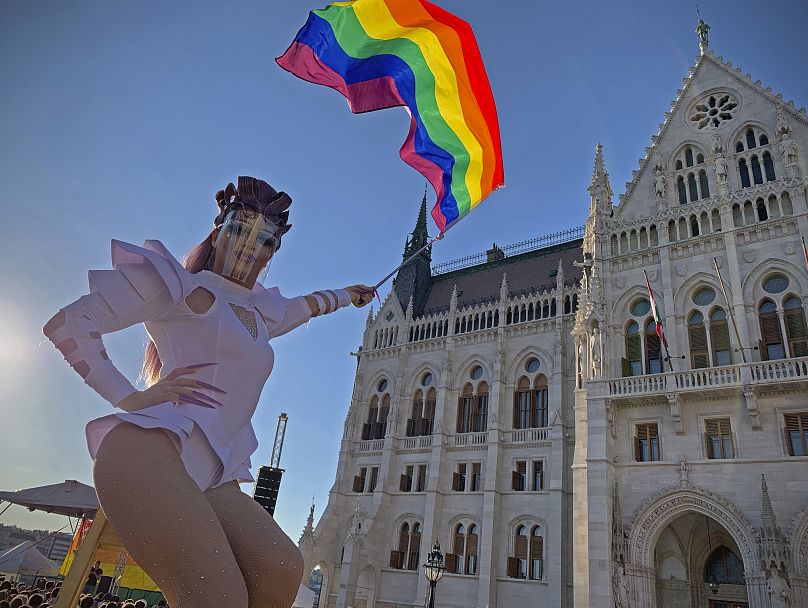Surveillance and the threat of imprisonment: Euronews spoke to Russian queer activists who have chosen to stay in the country, despite increasing hostility towards the LGBTQ+ community
In the heart of St. Petersburg, Sof, a volunteer at Centre-T, helps Russia’s trans community get care. He is currently inundated with a stream of desperate pleas for aid.
“I had to learn how to help people in completely different states of despair”, he told Euronews. “Many didn't know what to do next, many were afraid or in critical psychological conditions.”
Centre-T is one of the largest organisations connecting Russia's transgender community with medical care, hormones and even support for those seeking to flee the country.
In July, Moscow approved a law that prohibits gender-affirming care, nullifies marriages where at least one member has transitioned and bars transgender people from adopting or fostering children.
This comes on the heels of another bill from December 2022 that outlawed any positive or neutral representation of LGBTQ+ culture in public spaces, popular culture and even cinema.
This law is an extension of previous legislation aimed at minors.
Since these laws were passed, Centre-T enlisted three additional volunteers to help with the mounting workload, including Sof.
“We answer emails every day, every week, without holidays,” he explained.
“It's clear that it will be harder for everyone to live a life that would be comfortable, but I see one important thing. We have become more active in the entire community, sharing knowledge and supporting each other.”
'I’m terrified, but it’s the life I am living'
Sof told Euronews that Centre-T has received several hundred requests in recent months, some originating from profiles with suspicious-seeming names. These requests often demanded assistance in changing gender markers “right here, right now” and sought information about the centre's staff.
“They were not aware of transgender people at all and they were just trying to identify where a centre is located,” they said.
In July, Centre-T was designated a foreign agent, a status typically assigned to critics of the Kremlin. This designation requires organisers to handle burdensome paperwork, have limited access to funding, and face potential fines for non-compliance.
That same month, a court case was filed to block access to Centre-T's website.
Sof said he will continue working at Centre-T, despite the risks associated with volunteering for an LGBTQ+ organisation in Russia. “I'm terrified, of course, but I've been an activist since 2016 and this is the life I'm living.”
“I just know that someday it will be a question if I want to go to jail or if I want to leave. And surely, I don't want to go to jail."
Sof is not the only person facing this conundrum.
Aleksei, who is also based in St. Petersburg, has been an LGBTQ+ activist for over a decade. But since the COVID-19 pandemic and the start of Russia's full-scale invasion of Ukraine, protests have become almost impossible. Aleksei has been detained nine times for attending rallies.
His organisation, the Alliance of Straights and LGBT for Equality, was labelled a foreign agent in March.
“We had to freeze many of our plans and projects related specifically to regional development, because we now have an ethical obligation," Aleksei said. "A person who speaks openly under the brand of the alliance can be recognised as a foreign agent, and this has serious consequences."
This has also hampered how the Alliance organises itself.
“The people who come to us are at risk,” Aleksei added. “Because, supposedly, according to this law on agents, we must write reports on all the people who come to our events, including [details about] their names and passports.”
The activists must register their events with authorities two months in advance, even if they are simply showing a film.
Despite the challenges, Aleksei is determined to stay in Russia and continue his activism for as long as possible.
“If it's a question between prison and leaving, of course, you choose to leave, but I try to stay as long as possible because I see that many people can't leave and the LGBTQ+ community needs support,” he said.
In the current climate, experts are observing a surge in anti-LGBTQ+ sentiment.
Over the past couple of months, a university student was expelled after posting online videos of himself with makeup; a queer YouTuber was arrested after posting videos with his boyfriend; and a German teacher was deported for promoting “non-traditional sexual relations.”
“The trouble is that anyone can be targeted,” said Aleksei.
According to Maria Arkhipova, a Russian trans activist and human rights lawyer currently based in Georgia, these laws can even have a deadly impact on the country's LGBTQ+ community.
“People will find themselves in a situation where they will be forced to end their lives by suicide. Some will be forced to flee abroad and so on,” she told Euronews.
Outside Russia
Other countries have also imposed laws restricting people’s ability to express their identities publicly.
In 2021, Hungary passed a law banning the display of homosexual content to minors. Some regions in Poland have also attempted to impose so-called ‘LGBT-Free Zones’.
In Uganda, a law passed in May prescribes the death penalty in some cases for “aggravated homosexuality,” or cases of sexual relations involving people infected with HIV.
According to Graeme Reid, the Director of Lesbian, Gay, Bisexual, and Transgender Rights at Human Rights Watch, there is a “common thread" between Russia and these other countries.
"I think that the way to understand the laws is, on the one hand, this is a minority rights issue because it has a disproportionate effect on LGBTQ+ people,” Reid told Euronews
“But what is at stake is something much broader than that […] This is a political tool towards a greater end and that end is fundamentally anti-democratic.
“Because, while it's targeting a specific minority group, the implications of it for human rights are so much broader than that and will affect the rights of everybody.”
